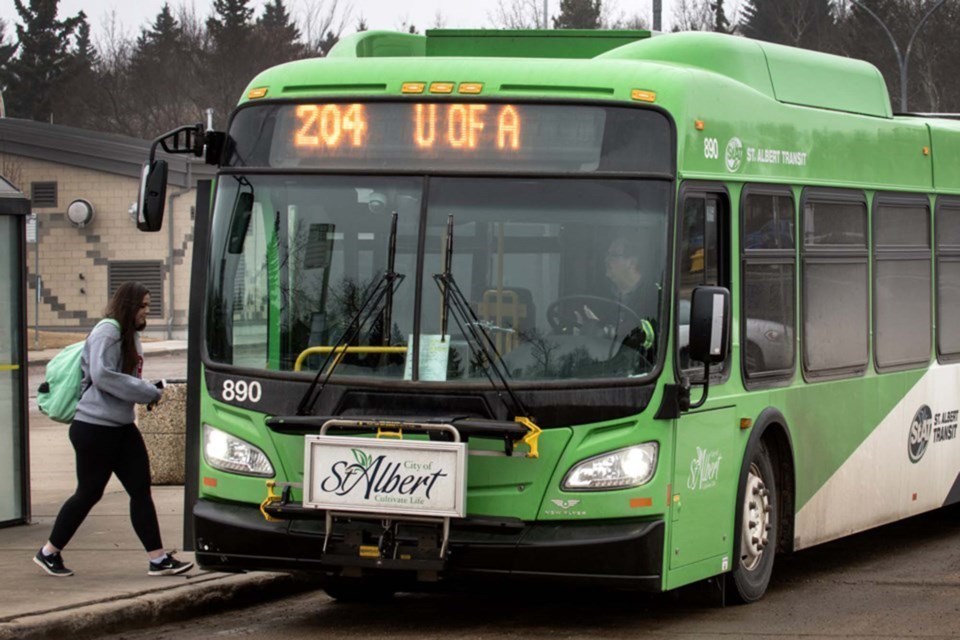St. Albert Chief Administrative Officer Bill Fletcher is one of nearly a dozen signatories of a new memorandum of understanding for regional transit collaboration involving 11 Edmonton-and-area municipalities.
The memorandum of understanding (MOU) is non-binding, has a five-year term after which the signatories can decide to extend it or dissolve the agreement, and does not require any financial commitment from the municipalities involved, Fletcher said.
“The MOU is the result of some ongoing discussions among municipalities on how we can align our efforts to improve service for transit riders in our region,” Fletcher said. “The major benefit of the ongoing discussions will be to explore ways we can coordinate the individual transit services of our respective municipalities to better serve the needs of residents in the region.”
Fletcher is the highest-ranking city staff member, and has held the CAO position since being hired by city council in June 2022.
He said St. Albert Transit will remain responsible for its own operations, and nothing will change in terms of how transit is funded.
“There's no sort of turf wars or any concerns about who owns what or who does what, because ultimately, it's just a venue that allows us to find solutions to be more effective across the entirety of the region,” he said.
One thing he hopes to see five years from now is improved route planning.
“Do I care if a St. Albert resident is on an ETS bus or St. Albert bus if it gets them where they need to go?" Fletcher said. "Conceptually, it shouldn't matter and we should be able to figure that out, and potentially prevent some duplication of routes as we look at the expansion across the region.”
Besides St. Albert, the other municipalities whose CAOs or city managers have signed onto the MOU are: Beaumont, Devon, Edmonton, Fort Saskatchewan, Leduc, Leduc County, Parkland County, Spruce Grove, Stony Plain, and Strathcona County.
Strathcona County CAO Darrell Reid is serving as the chair of the “Regional Transit CAO Roundtable,” according to a Jan. 18 news release from the City of Edmonton.
Reid said he thinks this new regional transit initiative can be thought of as “streamlined bureaucracy.”
“It's allowing the municipalities to really quickly try some things that the evidence says makes good sense to try,” Reid said, referring to a couple of recent examples of transit changes in the region, such as St. Albert's Nakî Transit Centre recently being used as a park and ride starting point for Edmonton Transit Service event services.
“We're able to make these tweaks and changes to service levels and kind of figure out how to each use our resources to provide great service to the region, and it happens very quickly now,” Reid said. “If things don't work exactly as you hoped they were going to, you can make adjustments really easily and quickly, and I think that success will lead to further changes and further evolution of the system as a whole.”
“We're already seeing wins and I think those wins will lead to more wins and we'll keep going forward.”
Another benefit of the new MOU partnership, for Strathcona County (Sherwood Park) especially, Reid said, is each municipality is maintaining control and responsibility for its own transit service, staff, and assets, unlike the model designed for the now defunct Edmonton Metropolitan Transit Services Commission (EMTSC).
In December of 2022, the EMTSC was mere months away from taking over responsibility for operating transit services in the Edmonton area, including St. Albert, before the purported high costs of involvement led multiple municipal councils (Edmonton and Devon) to decide to withdraw from the commission at the last minute.
Without Edmonton's involvement, the EMTSC board, which included St. Albert city councillor Wes Brodhead, decided the commission was no longer tenable, and in January of last year the board voted to dissolve.
“In fairness, all the previous commission members needed some time to work through what was going on with the commission, so it wasn't immediate,” Reid said when asked when CAOs in the region started working together on this regional transit project. “It kind of almost organically rose up in the months following.”
“All the municipalities and the administrations are in constant conversation about all kinds of different things that could lead towards regional collaboration [and] in the months that followed the transit commission challenges, this became one of the topics that we were talking about as to what's next.”
When asked why Sturgeon County and Morinville — the only two municipalities who haven't signed onto the new MOU who were original members of the EMTSC — Reid said that Morinville is “a municipality that we're sharing information with.”
“It's open to everyone,” Reid said. “The municipalities that have really distinct clear transit services, it was really easy for them to engage right away if they liked the look of what the model could be.”
Sturgeon County does not operate a public transit system.
Coun. Brodhead said he hopes the new regional transit initiative will be a success, but it will certainly be less of a system overhaul than what the EMTSC would have been.
“We'll see how it plays out,” he said. “Any sort of initiative that improves the transit service to residents of the region is a good thing.”
“I thought we had the best model, but that wasn't politically palatable.”
Edmonton city manager Andre Corbould is quoted in Edmonton's Jan. 18 news release as saying he thinks this approach will serve transit users well.
“The City of Edmonton believes this collaborative approach will help better connect riders to their destinations throughout the region,” he said. “By working together, we can enable the development of a convenient, reliable and seamless regional transit experience, which will further support mobility, ridership growth and economic investment across the Edmonton metro region.”




